Iain Stirling interview: The voice of Love Island on how the show helps his stand up
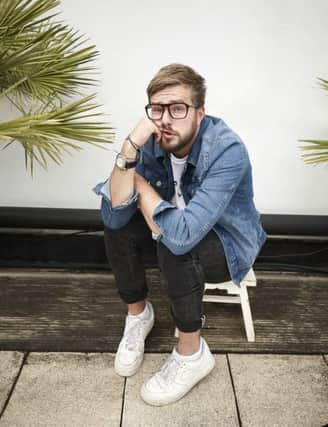

Iain Stirling, voice of hit reality series Love Island emerges from the venue where he’s just performed a stand-up show. It’s back in Festival time and the Edinburgh native and I adopt resident mode to walk up the high street. Head down, moving swiftly, swerving tourists and avoiding eye contact with leafleters, he’s vaping and chatting as we power up the hill to find somewhere quiet to chat.
“Iain, Iain,” a woman shouts back outside the venue.
“Someone’s shouting you I say,” and turn round, assuming he’s left something behind.
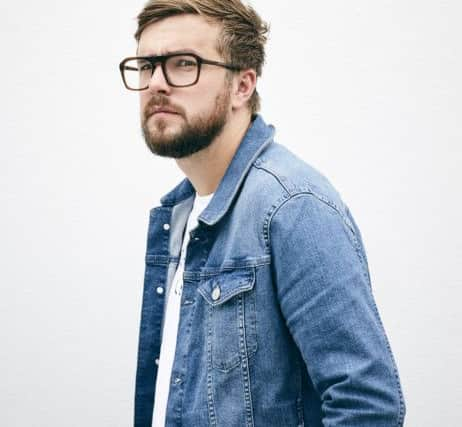

“Just keep your head down and keep walking,” he says. “This happens.”
“Oh right, of course, I forgot you’re famous,” I say. Stirling laughs.
As we continue I see more people clock him as we pass, nudging their pals and saying, “That’s Iain off Love Island.”
“It’s not that I don’t want to stop and talk,” he says, “but people don’t really know what to say, so it’s a bit awkward.”
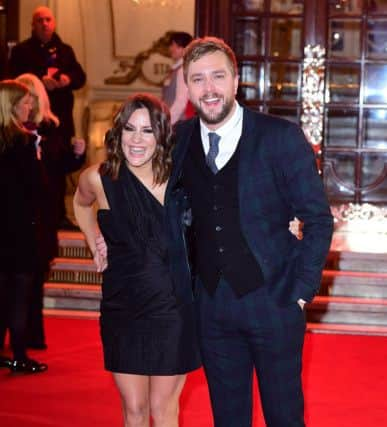

With seven million viewers watching young singletons searching for love in the sun in each episode of ITV2’s Love Island, it’s no surprise 31-year-old Stirling is recognised. And as the voice of the most talked about TV reality show of our times, with his cheeky commentary making him the winner whichever couple comes out on top, his voice is even recognised over the phone.
“I was booking a holiday the other day and they were like, are you the Love Island guy? Do you want to go to Mallorca? We’ll give you a good deal,” he says. “They didn’t. I had to pay full price. I get recognised on the phone because it’s harder to cover up your voice than your head. You can put a hat on or something, but I can’t do accents. All I can do is talk like this.”
Not strictly true –in his stand-up he’s just done a very convincing Hacker T Dog, his former canine co-presenter on children’s TV, but it’s his natural voice that has propelled him into the spotlight. Stirling has fronted Love Island since it started in 2015, with his funny running commentary on the ins, outs, intimacies and inanities of the Islanders and never mind series winners Amber Gill and Greg O’Shea, it’s Stirling who’s become a household name.
“Season two we were on a million viewers, now consolidated it’s seven. Every year it gets bigger. It’s bigger than EastEnders and it’s on ITV2,” says Stirling.
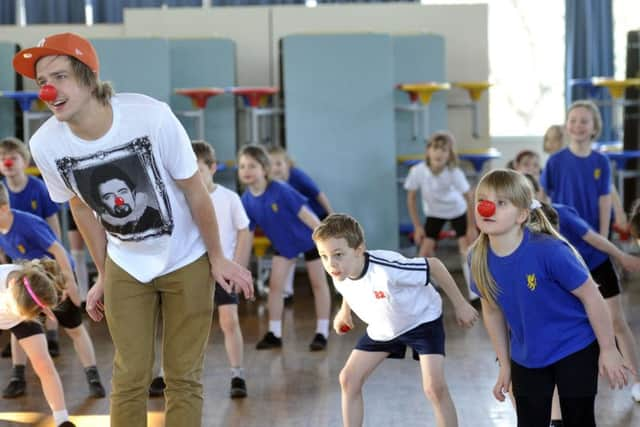

If Amber and Greg are no longer feeling the love, having split up almost immediately, Stirling is, and credits Love Island with boosting his profile. This year’s Fringe show sold out on announcement, ditto last year’s.
“I’ve been doing the Fringe for years, seven solo shows, and never got reviewed by The Scotsman, and now you’re here,” he says. “I’m on the cover, and they have never reviewed one of my shows. Even though back in the day I was one of the few acts from Edinburgh, still nothing. Not a nibble.” And because he’s a charmer he adds, “It’s OK, I know there are millions of shows. But Love Island has changed everything. I’m genuinely brilliantly grateful.
“And it’s nice to find something you’re good at,” he continues. “I like doing stand-up and I’d like to think I’m good at it, but you can’t help but look at a Kevin Bridges or a Billy Connolly and they’re THAT.” He holds his hand up high to signify a high bar. “But with voice-over on a reality TV show, I think I’m pretty up there, maybe one of the best. It’s a confidence boost, which helps my stand-up because I’ll try more interesting stuff. So it’s been an absolute game changer. I do proper tours now, people know who I am, they’re interested.”
In stand-up Stirling is a different beast to his Love Island self: sweatier, swearier and straight in to exchange banter with the Friday night post-work, pre-pub audience. In a fast hour of observational comedy he showcases his storytelling skills and his humour is directed at himself rather than the Islanders. His material is his life and how he’s a bit of a loser in navigating the challenges of every day, yet somehow stumbles into success, hence the forthcoming UK and Ireland tour title, Failing Upwards.
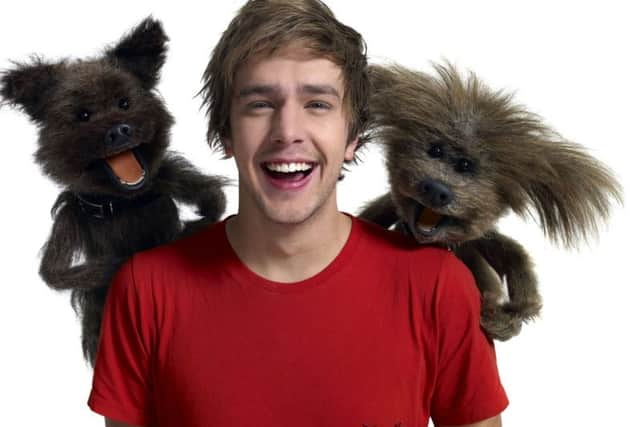

“Everything I do sort of goes wrong but I always sort of get away with it,” he says. It’s based on what comedian Kiri Pritchard-Mclean said about me and I entirely agreed with, that I was failing upwards through life. My girlfriend [Laura Whitmore, TV presenter on the Brits, I’m a Celebrity… and face of MTV Europe] and my family said it was the most accurate description they’d heard about me in the history of the world.”
Most of the time Stirling sets out to be helpful, he explains, as he politely pours water for us and it splashes around the glasses onto the table. “Oops, made a right hash of that,” he says.
“My stuff is observational, what people do with their lives from the angle of a man that can’t pull it off. So if I talk about having a family, it would be through the medium of a man who is in no fit state to be given a child to look after,” because in Stirling’s case, he can’t even look after his shoes when he tries out a yoga class.
“Basically the show is about a man progressively failing to carry out the basics.”
Stirling confirms this lovable yet infuriating persona as he tells me a story about a recent mess-up affecting his partner, who after visiting him in Edinburgh was sent home to London with a set of keys he had found and convinced her they were a formerly mislaid set for her house.
“In fact they were for another house I’d lost the keys to several years ago, but I’d forgotten that. When she got back to London after seven hours on the train with her dog, she was locked out and she was raging. Also resigned, wondering why she had left me in charge of sorting out her keys. I’m well-meaning,” he stresses, “which probably makes it even more annoying. I don’t know if I just don’t check stuff or get stressed because I know I’m likely to get it wrong, so I do.”
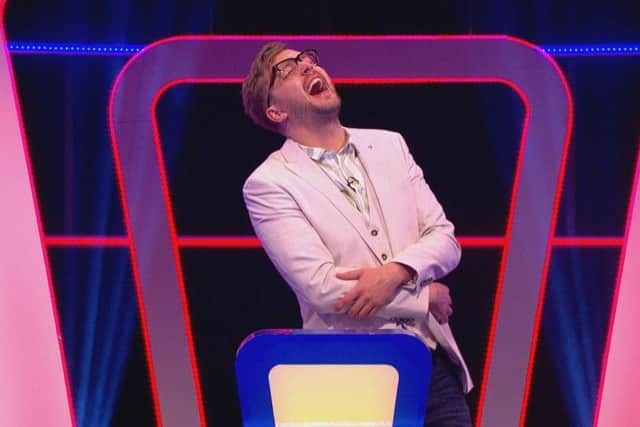

Hence the desire to soundboard and expand his stand-up material at the Fringe before taking it on tour. He projects a slightly makeshift, febrile atmosphere into the small 50-seater room from the start by playing random music off his phone through a speaker as the audience arrives.
“Tonight was the Tiny Changes Scott Hutchison album,” he says. “I’ve always admired his writing because it’s sort of a lot of the same stuff I talk about, through a different medium, and he’s a hell of a lot more poetic and astute. I suppose it was a weird choice because it puts you in a bizarre headspace, but that’s what I’m listening to. Maybe I went a bit too far and everyone was a bit perturbed, hmmm...”
On his home turf – he was raised on the capital’s south side and went to Liberton High School – his accent is more Edinburgh than on telly, things become fings, with is wiv, thought sounds like fought.
“How I am as a stand-up isn’t what you’d expect if you’ve seen me on television. I’m quite a sweaty and loud individual and quite a sweary person anyway, but on stage it’s like a nerves thing and I swear too much. Telly by its nature is a fairly-watered down medium because you’ve got regulations, but in a 50-seater barn, there aren’t the same pressures.
If he’s nervous, he doesn’t seem it, having done a decade of stand-up, starting when he was studying at Edinburgh University. Bitten by the comedy bug as a teenager – “When everyone else was playing football or drinking in the park, I was going to see Flight of the Conchords, The Mighty Boosh, people like that in tiny venues to nobody, so that was cool.”
By his fourth year of law, which he didn’t really love despite it being the family business – his mum worked in the university law school and his dad for a law firm – his gigs were starting to pay and his comedy career took off where his legal career didn’t.
“The minute I did stand-up university went out the window, exam results crumbled. I was writing my dissertation on the train to Glasgow to do a gig above a pub for no money, and making up a bibliography off the top of my head. So it all went to bollocks really.”
After reaching the finals of the Scottish Comedian of The Year 2008 and the Chortle Student Comedy Awards in 2009, he was spotted at a gig and offered a presenting job on children’s TV. From 2009-13, he fronted CBBC’s Scoop with Hacker the dog, then moved on to host the BAFTA-nominated The Dog Ate My Homework, CBBC’s answer to Mock the Week. He supported Russell Kane on tour, while raising his TV profile by hosting comedy gameshow CelebAbility (ITV2), appeared on Taskmaster (Dave), The Russell Howard Hour (Sky One), Comedy Central’s The Comedy Bus, Drunk History, The Comedy Store and Unspun with Matt Forde. He won a BAFTA for Children’s Presenting in 2016, becoming the voice of the BAFTAs for TV last year and contributing to Scotland’s BBC Hogmanay offering, but it was becoming the narrator of Love Island in June 2015 that made his name.
Stirling has also found time to write a book, Not Ready to Adult Yet, launched in paperback earlier this year, along with a companion podcast. With the same yarn-spinning quality of his stand-up, Stirling turns everyday activities and his life so far into laugh out loud anecdotes. In fact his parents and particularly, late gran, are comedy gold. His gran’s answer to Stirling and his sister Kirsten’s complaints of boredom was a quick drive around the estate locked in the boot of her car.
“It was the early 90s, that sort of thing was allowed. We loved it. She was brilliant. I remember one time she opened a tin of Postman Pat Alphabet Spaghetti and she said the shapes – the van, Pat, Jess the cat – were all Edinburgh Post Offices. ‘Oh, there’s Mortonhall…’”
For anyone unaware of the phenomenon of Love Island, unlikely as that is, Stirling obliges with a description.
“It’s a dating show. An interesting glimpse into the psychology of attractive people. I love that the people on the show are beautiful and have based their personality and conduct around the proviso of being the best-looking person in the room. Take that away from them and it’s really interesting how they adapt.”
Stirling is loved up with Whitmore, but if he wasn’t, could he ever see himself Love Island-bound?
“I am a slightly overweight man in his 30s, which I don’t think is what they’re after,” he says. “Also they don’t drink, occasionally a glass of wine, and I couldn’t deal with that.”
Really? I’d always assumed from their behaviour that the Islanders were hammered.
“No, that’s what young people do,” he says. “That’s what young people say. People ask me what do you make of blahdey-blah and blahdey-blah breaking up, and I’m like ‘they’re both 22, that’s what they do.’”
As for the ethics of making entertainment from millennials happy to expose their lives and experiences, Stirling has a clear conscience.
“What they are doing on Love Island is what they would be doing anyway on social media, but on a bigger scale. People say ‘you’re putting people’s lives out there’, yeah, we all do it every day. We’ve bred this generation of people that just want to perform and be noticed and social media is the answer to that. You can perform all the time to nobody for no reason whatsoever, and we’ve all gone, brilliant, I’m going to do that. You edit your own life and get to watch it back as your own audience, thinking look how great I am.
“Basically Love Island is a pure entertainment show. No-one’s trying to make a social commentary. However, through doing it there’s a chance to look at how people are, actually I don’t know if it’s millennials any more, what are they, Generation Z? That’s global warming for you, we’re on Z already. No more generations left, we’re done.”
But reality TV has come under the spotlight and Love Island is not immune to criticism. Former contestants Sophie Gradon and Mike Thalassitis committed suicide, and along with the death of a former subject of ITV’s The Jeremy Kyle Show, this has given rise to questions about the support provided for those who appear.
Stirling is keen to talk about the issues surrounding reality TV and is well placed to comment.
“There are several things,” he says. “First the psychological element, and not just because of Love Island, but in general people are becoming a lot more aware of mental health, which is a very, very good thing.
“Then there’s making sure people have a good team around them. They can get counselling and since series one we’ve had a psychologist on site the entire time.
“And also, I think there’s a societal element where everyone has to remember these are human beings. The show has a responsibility to make sure people are all right afterwards, but you’d like to think we all have a duty to each other. It’s sad that a TV show has to look after its contestants because people online are so horrible to them, a horrible indictment of our society.
“That’s not to put any less onus on ITV and Love Island to look after those people because they absolutely do; we have a duty of care. But I think it’s maddening we’re in a world where human beings, mainly on social media, will be so horrible to someone because they were on a TV show, that we’ve got to look after them. It’s crazy. “
With the public appetite for Love Island showing no sign of losing its ardour, Stirling will be back voicing for voyeurs of the villa next year. In the meantime he’s itching to get his own show on the road.
“I can’t imagine not ever doing stand-up,” he says. “I would take that over anything, any time. When I started doing it I felt ‘oh, this is what it’s like doing something you like.’ And when you love something, you can accidentally be quite hard working at it.”
Putting that much effort in, he deserves to fail – upwards.
Tickets for Iain Stirling’s extra filmed Failing Upwards matinee at King’s Theatre, Edinburgh on 29 March 2020 at 5pm go on sale on 1 October at 10am.
Other tour dates include 27 March, The Pavilion, Glasgow; 28 March, Town Hall, Falkirk; 29 March, King’s Theatre, Edinburgh; 4 April, Music Hall, Aberdeen, see https://iain doesjokes.com for tickets